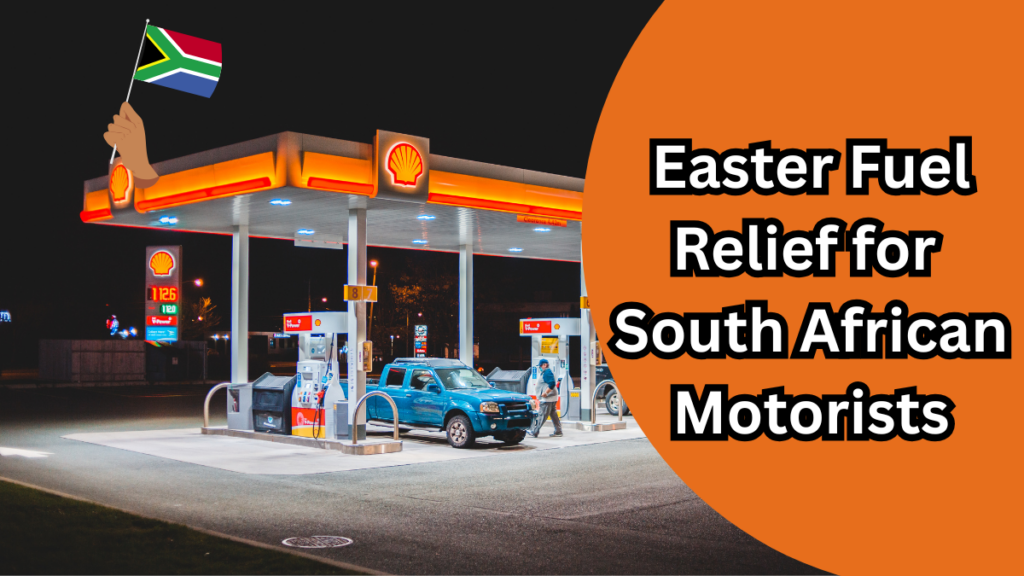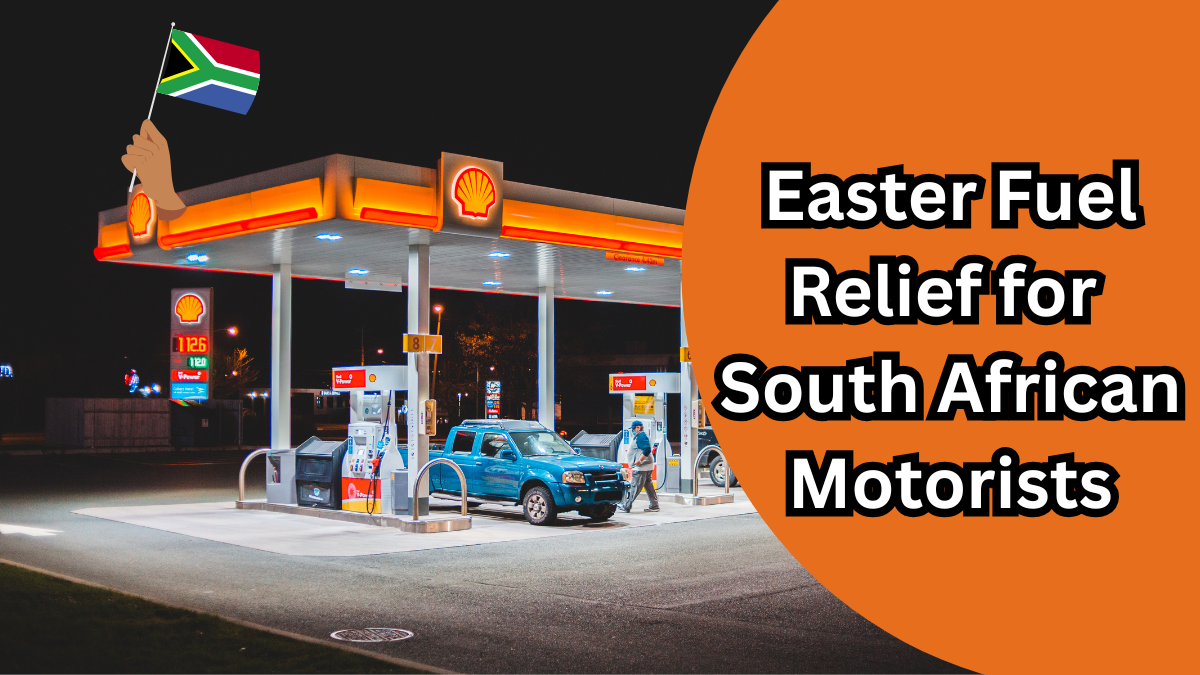As the Easter holiday approaches, South African motorists have a reason to feel optimistic. A welcome reduction in fuel prices is set to take effect on April 2, 2025, providing financial relief for travelers, families, and transport-reliant businesses alike. With petrol prices dropping by up to 88 cents per litre and diesel costs declining by nearly R1 per litre, this change is expected to make Easter road trips significantly more affordable.
But what’s behind this sudden price drop? And how will it impact the average South African household? Let’s unpack the details.

Summary of Expected Fuel Price Adjustments – April 2025
According to data released by the Central Energy Fund (CEF), here’s a breakdown of the expected changes:
| Fuel Type | Estimated Price Decrease | New Pump Price (per litre) |
|---|---|---|
| Petrol 93 | 64 cents | R20.60 |
| Petrol 95 | 78 cents | R20.77 |
| Diesel 0.05% | 90 cents | R18.47 |
| Diesel 0.005% | 93 cents | R18.52 |
While earlier forecasts hinted at even sharper price drops, the revised figures still reflect a significant reduction that benefits both private motorists and commercial transport operators.
Key Factors Behind the Fuel Price Decline
This fuel price dip is not the result of a single event—it’s the outcome of several interlinked economic and geopolitical developments.
1. Decrease in Brent Crude Oil Prices
Brent crude oil, a global benchmark for fuel pricing, has dropped below $70 per barrel—the lowest price point in over six months.
-
This drop reflects global concerns about oversupply and reduced demand.
-
Lower crude oil prices directly impact the cost of refined products such as petrol and diesel in South Africa.
2. OPEC+ Increasing Production
The Organization of the Petroleum Exporting Countries (OPEC+) recently decided to increase production by 2 million barrels per day beginning in April.
-
This supply expansion puts downward pressure on global oil prices.
-
Increased availability stabilizes markets and benefits importing countries like South Africa.
3. Stable Rand Against the Dollar
The strength and consistency of the South African Rand have helped cushion local fuel prices against global volatility.
-
A stable exchange rate lowers the cost of importing crude oil.
-
It also protects consumers from sudden surges in pump prices due to currency fluctuations.
4. Government’s Continued Freeze on Fuel Levies
For the third consecutive year, the South African government has chosen not to increase the General Fuel Levy and Road Accident Fund (RAF) levy.
-
This decision prevents additional costs from being added to already expensive fuel.
-
It reflects a broader effort to provide financial relief to consumers amid tough economic conditions.
5. Slight Increase in Carbon Tax
However, it’s not all positive. A 3-cent per litre increase in the carbon tax has been introduced, slightly reducing the full impact of the fuel price decrease.
-
The carbon tax is part of South Africa’s climate policy.
-
While minimal, this increase will still be noticed by high-consumption motorists and fleet operators.
The Broader Economic Context: Why This Matters
The reduction in fuel prices is closely tied to the overall state of the South African economy.
Lower Inflation
South Africa’s inflation rate dropped to 3.8% in March 2025, down from 4.5% in February.
-
Fuel is a key component of inflation baskets, so price cuts help keep overall living costs in check.
-
Cheaper transport can also translate into reduced food prices and lower production costs across industries.
Monetary Policy Remains Steady
The South African Reserve Bank (SARB) has maintained the repo rate at 7.5%, a move aimed at balancing inflation control and economic support.
-
With interest rates steady and inflation easing, consumers have slightly more financial breathing space.
-
Businesses benefit from predictable financing conditions, which support investment and growth.
Impact on Households and Businesses
For Everyday Motorists
-
With prices falling by up to 93 cents per litre, the average motorist could save R46.50 on a 50-litre tank of diesel.
-
These savings are especially meaningful for long-distance drivers over the Easter period.
For Public Transport and Freight Operators
-
The cost of operating buses, taxis, and delivery trucks drops, potentially leading to cheaper fares and more affordable goods.
-
Lower fuel prices can reduce pressure on transport-dependent sectors such as agriculture, manufacturing, and retail.
For Struggling Households
-
Many South Africans are already grappling with rising food prices, electricity costs, and stagnant wages.
-
A cut in fuel prices provides direct relief and helps households stretch their budgets further.
What Lies Ahead for Fuel Prices?
While the current fuel price drop is cause for celebration, it may not be permanent.
-
Analysts suggest that further reductions could be seen in May 2025 but only if current conditions hold.
-
However, global uncertainty—such as conflicts in oil-producing regions or unexpected changes in OPEC+ policy—could quickly reverse this trend.
The Department of Mineral Resources and Energy will finalize the price adjustments by April 1, 2025, with implementation from April 2, 2025.
Frequently Asked Questions (FAQs)
1. How much will I actually save on fuel this Easter?
If you usually fill up a 50-litre tank, you could save between R32 and R46, depending on whether you use petrol or diesel.
2. Why does Brent crude oil affect fuel prices in South Africa?
South Africa imports crude oil, and Brent crude is the global pricing benchmark. Changes in Brent crude prices directly influence local petrol and diesel costs.
3. Will public transport fares go down due to cheaper diesel?
Possibly. While not guaranteed, some taxi associations and bus companies may pass on savings to commuters, especially during holiday periods.
4. Can fuel prices increase again in winter?
Yes. Fuel prices are influenced by global demand patterns. If winter demand rises in the Northern Hemisphere or if supply is disrupted, prices could increase again.
Final Thoughts
As South Africans prepare for Easter travels, this drop in fuel prices brings welcome news. From families heading out on holiday to small businesses operating delivery fleets, the reduction offers real, tangible benefits. However, as with all things influenced by global markets, these gains must be enjoyed with cautious optimism.
Click here to learn more
Sachin is an experienced writer with a strong background in education-related content. With years of expertise in creating informative and engaging material, he covers topics such as teaching strategies, educational technology, and learning methodologies. His work aims to inspire both educators and learners, reflecting his deep understanding of the evolving education landscape.

